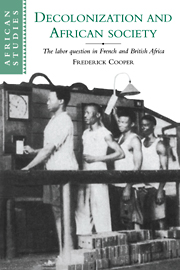Book contents
- Frontmatter
- Contents
- List of tables and figure
- Preface
- List of abbreviations
- Map of French and British colonial Africa
- 1 Introduction
- Part I The dangers of expansion and the dilemmas of reform
- Part II Imperial fantasies and colonial crises
- Part III The imagining of a working class
- Introduction
- 7 The systematic approach: the French Code du Travail
- 8 Family wages and industrial relations in British Africa
- 9 Internationalists, intellectuals, and the labor question
- Conclusion: labor and the modernizing state
- Part IV Devolving power and abdicating responsibility
- Conclusion
- Notes
- Bibliography
- Index
- OTHER BOOKS IN THE SERIES
9 - Internationalists, intellectuals, and the labor question
Published online by Cambridge University Press: 22 February 2010
- Frontmatter
- Contents
- List of tables and figure
- Preface
- List of abbreviations
- Map of French and British colonial Africa
- 1 Introduction
- Part I The dangers of expansion and the dilemmas of reform
- Part II Imperial fantasies and colonial crises
- Part III The imagining of a working class
- Introduction
- 7 The systematic approach: the French Code du Travail
- 8 Family wages and industrial relations in British Africa
- 9 Internationalists, intellectuals, and the labor question
- Conclusion: labor and the modernizing state
- Part IV Devolving power and abdicating responsibility
- Conclusion
- Notes
- Bibliography
- Index
- OTHER BOOKS IN THE SERIES
Summary
The pioneers of new ways of thinking about African labor were bureaucrats – the Inspecteurs du Travail, the labour officers and commissioners, members of investigatory commissions, and a number of governors and ministry officials. As they made their case for stabilization within their governments, they also talked to each other, notably at the ILO and since 1948 at the Inter-African Labour Conferences (IALCs). The international discussions helped to anchor an agenda, giving a global imprimatur to what labor specialists were trying to do inside colonial governments and defining what was a discussable social issue. The ILO had agreed in 1944 and in more specific form in 1947 that the basic standards of labor policy which that organization applied to independent countries should apply to “non-metropolitan” areas as well. From there, a common agenda for the ILO and the IALC shaped discussions well into the 1950s: limiting migration, promoting stability in employment, paying family wages, developing systems of social insurance, establishing institutions to carry out inspections and insure regulations were followed, providing mechanisms for collective bargaining, and increasing the productivity of African labor. That the United Nations should publish in the 1950s a Report on the World Social Situation suggests how much the social had become a domain for international surveillance and judgment.
It was only in the first half of the 1950s that there developed a significant body of scholarship on labor and urbanization in Africa. The sequence is important: the new scholarship appeared after the new policies had been decided upon. New labor policy was a direct response, drawing on metropolitan experience, by civil servants to a challenge raised by colonial workers.
- Type
- Chapter
- Information
- Decolonization and African SocietyThe Labor Question in French and British Africa, pp. 361 - 382Publisher: Cambridge University PressPrint publication year: 1996

